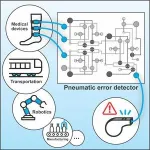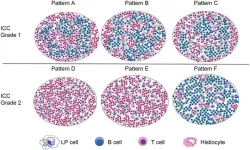(Press-News.org) A new, air-powered computer sets off alarms when certain medical devices fail. The invention is a more reliable and lower-cost way to help prevent blood clots and strokes — all without electronic sensors.
Described in a paper in the journal Device, the computer not only runs on air, but also uses air to issue warnings. It immediately blows a whistle when it detects a problem with the lifesaving compression machine it is designed to monitor.
Intermittent pneumatic compression or IPC devices are leg sleeves that fill with air periodically and squeeze a person’s legs to increase blood flow. This prevents clots that lead to blocked blood vessels, strokes, or death. Typically, these machines are powered and monitored by electronics.
“IPC devices can save lives, but all the electronics in them make them expensive. So, we wanted to develop a pneumatic device that gets rid of some of the electronics, to make these devices cheaper and safer,” said William Grover, associate professor of bioengineering at UC Riverside and corresponding paper author.
Pneumatics move compressed air from place to place. Emergency brakes on freight trains operate this way, as do bicycle pumps, tire pressure gauges, respirators, and IPC devices. It made sense to Grover and his colleagues to use one pneumatic logic device to control another and make it safer.
This type of device operates in a similar way to electronic circuits, by making parity bit calculations. “Let’s say I want to send a message in ones and zeroes, like 1-0-1, three bits,” Grover said. “Decades ago, people realized they could send these three bits with one additional piece of information to make sure the recipient got the right message.”
That extra piece of information is called a parity bit. The bit is a number — 1 if the message contains an odd number of ones, and 0 if the message contains an even number of ones. Should the number one appear at the end of a message with an even number of bits, then it is clear the message was flawed. Many electronic computers send messages this way.
An air-powered computer uses differences in air pressure flowing through 21 tiny valves to count the number of ones and zeroes. If no error in counting has occurred, then the whistle doesn’t blow.
If it does blow, that’s a sign the machine requires repairs. Grover and his students, in a video demonstrating the air computer, are shown damaging an IPC device with a knife, rendering it unusable. Seconds later, the whistle blows.
“This device is about the size of a box of matches. It replaces a handful of sensors as well as a computer,” Grover said. “So, we can reduce costs while still detecting problems in a device. And it could also be used in high humidity or high temperature environments that aren’t ideal for electronics.”
The IPC device monitoring is only one application for air computing. For his next project, Grover would like to design a device that could eliminate the need for a job that kills people every year — moving around grain at the top of tall silos.
Tall buildings full of corn or wheat, grain silos are a common sight in the Midwest. Often times, a human has to go inside with a shovel to break up the grains and even out the piles inside.
“A remarkable number of deaths occur because the grain shifts and the person gets trapped. A robot could do this job instead of a person. However, these silos are explosive, and a single electric spark could blow a silo apart, so an electronic robot may not be the best choice,” Grover said. “I want to make an air-powered robot that could work in this explosive environment, not generate any sparks, and take humans out of danger.”
Air-powered computing is an idea that has been around for at least a century. People used to make air-powered pianos that could play music from punched rolls of paper. After the rise of modern computing, engineers lost interest in pneumatic circuits.
“Once a new technology becomes dominant, we lose awareness of other solutions to problems,” Grover said. “One thing I like about this research is that it can show the world that there are situations today when 100-plus-year-old ideas can still be useful.”
END
How air-powered computers can prevent blood clots
Lowering healthcare costs by relying less on electronics
2024-08-14
ELSE PRESS RELEASES FROM THIS DATE:
Fear of appearing prejudiced can inhibit accurate performance feedback to women
2024-08-14
PULLMAN, Wash. – Evaluators who want to avoid appearing prejudiced may overcorrect and give women inflated performance feedback, new research indicates, which is a practice that could ultimately hinder their ability to improve and advance.
A Washington State University-led research team investigated the connection between overly positive performance reviews and “protective paternalism,” the belief that women need to be handled carefully and shielded from harm.
While it may be well-intentioned, ...
Chromatin structure plays a key role in canine social behavior evolution
2024-08-14
A new study on dogs found that chromatin's spatial structure has a significant role in the evolution of social behavior. Chromatin, the compact form of DNA, not only packages genetic material but also plays a crucial role in gene regulation. This study demonstrates that both the linear sequence of DNA and its three-dimensional configuration are linked to friendly behavior shaped by dog domestication, providing new insights into the molecular mechanisms underlying social traits.
Behavioral traits such as sociability are influenced by numerous genes, their interactions, environmental factors, and individual life experiences.
Because ...
Work-related stress may increase the risk of an irregular heart rhythm
2024-08-14
Research Highlights:
Adults in white-collar jobs in Canada with high job strain and for whom significant efforts are met with low rewards (such as low salary or recognition) may face a 97% increased risk for developing the irregular heart rhythm condition known as atrial fibrillation, or AFib or AF, compared to workers not exposed to these work stressors.
Separately, high job strain alone was associated with an 83% higher risk of developing AFib, and effort-reward imbalance alone was associated with a 44% greater risk.
Recognizing and addressing these stressors at work may be an effective strategy ...
Massive biomolecular shifts occur in our 40s and 60s, Stanford Medicine researchers find
2024-08-14
If it’s ever felt like everything in your body is breaking down at once, that might not be your imagination. A new Stanford Medicine study shows that many of our molecules and microorganisms dramatically rise or fall in number during our 40s and 60s.
Researchers assessed many thousands of different molecules in people from age 25 to 75, as well as their microbiomes — the bacteria, viruses and fungi that live inside us and on our skin — and found that the abundance of most molecules ...
Study reveals that memories of the COVID-19 pandemic lockdowns predict declines in psychological well-being of children and adolescents
2024-08-14
The COVID-19 pandemic and the lockdown measures to prevent contagion resulted in extensive disruptions in children’s and adolescents’ everyday lives. A new study in Child Development from the Aarhus University Hospital in Denmark, University of California, Riverside and University of California, Davis in the United States, investigated personal memories (i.e., memories for episodes experienced in one’s own life) about the first lockdown in Denmark in Spring 2020 among children and adolescents and how this may have impacted their psychological well-being over the following year.
For context, in ...
Severe menopause symptoms may take toll on brain health
2024-08-14
CLEVELAND, Ohio (August 14, 2024)—With more than 24 million people globally living with dementia without a cure in sight, there is a lot of focus on ways to prevent and delay cognitive impairment. A new study suggests that severe menopause symptoms such as hot flashes and depression can negatively affect cognitive function in postmenopausal women. Results of the study are published online today in Menopause, the journal of The Menopause Society.
In conjunction with our aging population, dementia diagnoses are on the rise. It ...
Historic map reveals how mussel farm is bringing shellfish reefs back to the seabed
2024-08-14
The UK’s first large scale offshore mussel farm is allowing shellfish reefs to return to parts of the seabed off England’s south coast for the first time in up to 150 years, a new study has revealed.
Researchers have spent the past decade examining the environmental impact of the farm, which was first established in Lyme Bay off the coast of South Devon in 2013.
In that time, the seabed beneath the farm’s ropes has begun to undergo a transformation as mussels from the lines are ...
Power up your health with self-sustaining electronics
2024-08-14
Imagine a coat that captures solar energy to keep you cozy on a chilly winter walk, or a shirt that can monitor your heart rate and temperature. Picture clothing athletes can wear to track their performance without the need for bulky battery packs.
University of Waterloo researchers have developed a smart fabric with these remarkable capabilities. The fabric has the potential for energy harvesting, health monitoring, and movement tracking applications.
The new fabric developed ...
Histopathologic features and differential diagnosis in challenging cases of nodular lymphocyte predominant B-cell lymphoma/Nodular Lymphocyte Predominant Hodgkin Lymphoma
2024-08-14
This review offers an in-depth exploration of Nodular Lymphocyte Predominant Hodgkin Lymphoma (NLPHL), highlighting its distinct characteristics across various domains such as epidemiology, clinical presentation, histopathology, immunophenotype, genetic findings, and challenges in differential diagnosis.
Epidemiology and Clinical Presentation
NLPHL is a relatively rare subtype of Hodgkin lymphoma, comprising approximately 10% of all Hodgkin lymphoma cases. It predominantly affects males, with a higher incidence observed ...
Trojan horse method gives malaria parasites a taste of their own medicine
2024-08-14
More than a quarter of Australians over the age of 50 take cholesterol-lowering drugs to prevent heart disease and strokes, but our bodies also need cholesterol to survive. Now, scientists from The Australian National University (ANU) say its role as a basic building block of life holds the key to treating deadly diseases caused by parasites, including malaria.
The researchers have developed a trojan horse method that tricks malaria parasites into ingesting a fatal dose of drugs by exploiting the parasite’s need for cholesterol to survive. By attaching ...
LAST 30 PRESS RELEASES:
Roadmap for Europe’s biodiversity monitoring system
Novel camel antimicrobial peptides show promise against drug-resistant bacteria
Scientists discover why we know when to stop scratching an itch
A hidden reason inner ear cells die – and what it means for preventing hearing loss
Researchers discover how tuberculosis bacteria use a “stealth” mechanism to evade the immune system
New microscopy technique lets scientists see cells in unprecedented detail and color
Sometimes less is more: Scientists rethink how to pack medicine into tiny delivery capsules
Scientists build low-cost microscope to study living cells in zero gravity
The Biophysical Journal names Denis V. Titov the 2025 Paper of the Year-Early Career Investigator awardee
Scientists show how your body senses cold—and why menthol feels cool
Scientists deliver new molecule for getting DNA into cells
Study reveals insights about brain regions linked to OCD, informing potential treatments
Does ocean saltiness influence El Niño?
2026 Young Investigators: ONR celebrates new talent tackling warfighter challenges
Genetics help explain who gets the ‘telltale tingle’ from music, art and literature
Many Americans misunderstand medical aid in dying laws
Researchers publish landmark infectious disease study in ‘Science’
New NSF award supports innovative role-playing game approach to strengthening research security in academia
Kumar named to ACMA Emerging Leaders Program for 2026
AI language models could transform aquatic environmental risk assessment
New isotope tools reveal hidden pathways reshaping the global nitrogen cycle
Study reveals how antibiotic structure controls removal from water using biochar
Why chronic pain lasts longer in women: Immune cells offer clues
Toxic exposure creates epigenetic disease risk over 20 generations
More time spent on social media linked to steroid use intentions among boys and men
New study suggests a “kick it while it’s down” approach to cancer treatment could improve cure rates
Milken Institute, Ann Theodore Foundation launch new grant to support clinical trial for potential sarcoidosis treatment
New strategies boost effectiveness of CAR-NK therapy against cancer
Study: Adolescent cannabis use linked to doubling risk of psychotic and bipolar disorders
Invisible harms: drug-related deaths spike after hurricanes and tropical storms
[Press-News.org] How air-powered computers can prevent blood clotsLowering healthcare costs by relying less on electronics







